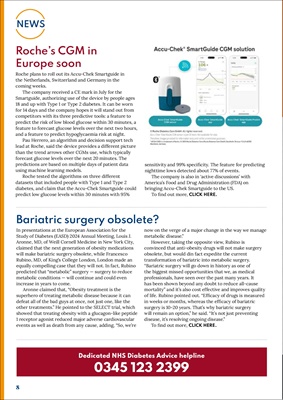
8
NEWS
Dedicated NHS Diabetes Advice helpline
0345 123 2399
Roche's CGM in
Europe soon
Roche plans to roll out its Accu-Chek Smartguide in the
Netherlands, Switzerland and Germany in the coming
weeks.
The company received a CE mark in July for the
Smartguide, authorizing use of the device by people ages
18 and up with Type 1 or Type 2 diabetes. It can be worn
for 14 days and the company hopes it will stand out from
competitors with its three predictive tools: a feature to
predict the risk of low blood glucose within 30 minutes, a
feature to forecast glucose levels over the next two hours,
and a feature to predict hypoglycaemia risk at night.
Pau Herrero, an algorithm and decision support tech
lead at Roche, said the device provides a different picture
than the trend arrows other CGMs use, which typically
forecast glucose levels over the next 20 minutes. The
predictions are based on multiple days of patient data
using machine learning models.
Roche tested the algorithms on three different
datasets that included people with Type 1 and Type 2
diabetes, and claim that the Accu-Chek Smartguide could
predict low glucose levels within 30 minutes with 95%
sensitivity and 99% specificity. The feature for predicting
nighttime lows detected about 77% of events.
The company is also in 'active discussions' with
America's Food and Drug Administration (FDA) on
bringing Accu-Chek Smartguide to the US.
To find out more, CLICK HERE.
Bariatric surgery obsolete?
In presentations at the European Association for the
Study of Diabetes (EASD) 2024 Annual Meeting, Louis J.
Aronne, MD, of Weill Cornell Medicine in New York City,
claimed that the next generation of obesity medications
will make bariatric surgery obsolete, while Francesco
Rubino, MD, of King's College London, London made an
equally compelling case that they will not. In fact, Rubino
predicted that "metabolic" surgery - surgery to reduce
metabolic conditions - will continue and could even
increase in years to come.
Aronne claimed that, "Obesity treatment is the
superhero of treating metabolic disease because it can
defeat all of the bad guys at once, not just one, like the
other treatments." He pointed to the SELECT trial, which
showed that treating obesity with a glucagon-like peptide
1 receptor agonist reduced major adverse cardiovascular
events as well as death from any cause, adding, "So, we're
now on the verge of a major change in the way we manage
metabolic disease."
However, taking the opposite view, Rubino is
convinced that anti-obesity drugs will not make surgery
obsolete, but would din fact expedite the current
transformation of bariatric into metabolic surgery.
"Bariatric surgery will go down in history as one of
the biggest missed opportunities that we, as medical
professionals, have seen over the past many years. It
has been shown beyond any doubt to reduce all-cause
mortality" and it's also cost effective and improves quality
of life. Rubino pointed out. "Efficacy of drugs is measured
in weeks or months, whereas the efficacy of bariatric
surgery is 10-20 years. That's why bariatric surgery
will remain an option," he said. "It's not just preventing
disease, it's resolving ongoing disease."
To find out more, CLICK HERE.